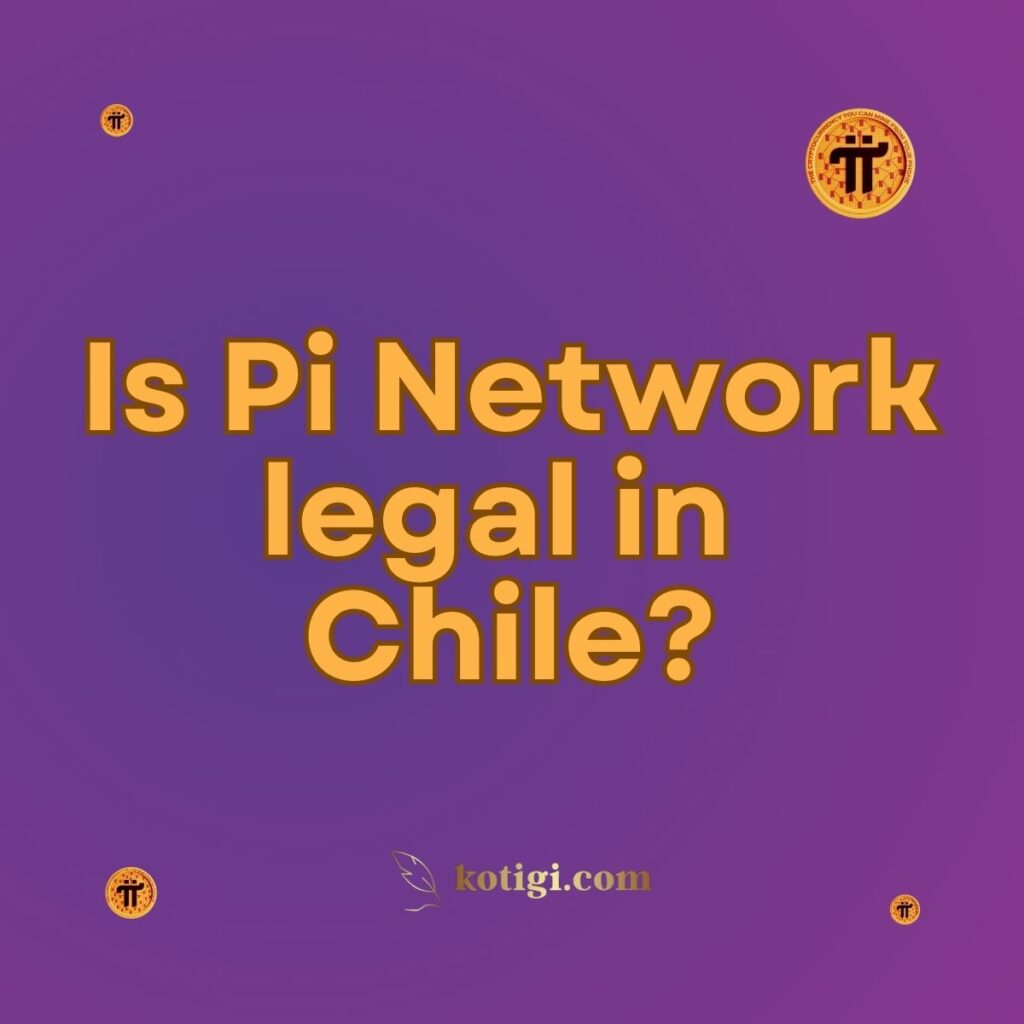
Is Pi Network legal in Chile?
Pi Network is not banned in Chile, but it operates in an unregulated environment. Chile has no specific cryptocurrency laws governing platforms like Pi Network, although the government has issued general warnings about digital currencies. Pi Network users in Chile can engage with the platform, but they should be cautious of future regulatory changes.
Introduction
Cryptocurrency adoption is on the rise in Latin America, and Chile is no exception. With the growing popularity of digital platforms like Pi Network, many Chileans are questioning its legal status. While Pi Network is not explicitly illegal in Chile, it operates in an unregulated space. The Chilean government has yet to establish specific laws addressing the legality of cryptocurrencies, leaving Pi Network users in a legal gray area.
This article explores the current legal standing of Pi Network in Chile and highlights important considerations for users engaging with the platform in the country.
Cryptocurrency Regulation in Chile
No Specific Cryptocurrency Laws
Currently, Chile does not have a comprehensive legal framework for regulating cryptocurrencies. This means that digital currencies, including Pi Network, are not explicitly banned or legalized. Chileans can engage with cryptocurrencies without violating any laws, but they do so at their own risk.
While cryptocurrency platforms like Pi Network are not regulated, this also means that users have little legal protection in case of disputes or issues with the platform.
Government Warnings and Cautionary Approach
Although Chile has not introduced specific laws governing cryptocurrencies, the Central Bank of Chile and other financial authorities have issued general warnings about the risks associated with digital currencies. These warnings focus on the volatility, lack of regulation, and potential for fraud or money laundering.
These statements do not constitute a ban, but they reflect the cautious stance the Chilean government takes toward the cryptocurrency market. Pi Network users should keep these risks in mind when participating in the platform, as the lack of regulation could leave them vulnerable.
Pi Network’s Presence in Chile’s Financial System
Mobile Mining and Its Legal Implications
Pi Network operates on a mobile mining model, allowing users to mine Pi coins without large financial investments or high-powered computing devices. This differentiates Pi Network from traditional cryptocurrencies, which often require significant energy consumption and investment in mining hardware.
Given this model, Pi Network has so far avoided significant legal scrutiny in Chile. Since Pi coins are not yet tradable, the platform may continue operating without attracting immediate attention from regulators. However, once Pi Network transitions to its open mainnet and coins become tradable, the platform may face new regulatory challenges.
Legal Gray Area for Users
Because Pi Network operates in an unregulated market, Chilean users are engaging with the platform in a legal gray area. There are no explicit laws against participating in Pi Network, but users should be aware that the lack of legal clarity may expose them to risks, particularly if the Chilean government decides to introduce regulations in the future.
For now, Pi Network users in Chile can participate without legal concerns, but they should remain informed about potential regulatory changes that could affect their involvement in the platform.
Legal Risks and Future Regulatory Possibilities
Potential Future Regulations
As cryptocurrencies become more widespread in Chile, the government may eventually develop laws to regulate their use. These regulations could cover issues like taxation, trading, and consumer protection. Pi Network’s future in Chile may be affected if the government decides to introduce a regulatory framework for digital currencies.
For Pi Network users, this means that while they can engage with the platform without restrictions today, future regulations could impose new legal requirements or limitations, especially once Pi coins become tradable.
Tax Implications for Cryptocurrency Users
Chile’s current tax framework does not have specific rules for cryptocurrencies, but general tax laws still apply. If Pi Network’s coins gain market value and users begin trading them, they could be subject to capital gains taxes. Chilean tax authorities are increasingly paying attention to cryptocurrency transactions, so users should be mindful of potential tax obligations in the future.
Pi Network users should prepare for these developments, particularly as the platform evolves and coins become tradable.
Regional and Global Trends Influencing Chile
South American Regulatory Landscape
Cryptocurrency regulation varies across South America. Countries like Brazil and Argentina have been more proactive in addressing digital currencies, with Brazil even working on developing a comprehensive regulatory framework. In contrast, Chile has been slower to act, focusing more on issuing warnings than on enacting formal laws.
However, as cryptocurrency usage grows in the region, Chile may eventually follow its neighbors in developing regulations. This could affect Pi Network and other cryptocurrency platforms operating in the country.
Global Regulatory Trends
Globally, countries are taking different approaches to regulating cryptocurrencies. The United States and European Union are gradually introducing clearer guidelines for digital assets, while countries like China have imposed strict bans on cryptocurrency activities. Chile could be influenced by these global trends as it considers how to regulate platforms like Pi Network.
Pi Network users in Chile should stay informed about both local and global regulatory developments, as they could have a significant impact on the platform’s legal standing in the future.
The Future of Pi Network in Chile
Will Chile Regulate Cryptocurrencies?
As Pi Network grows and its coins become tradable, the platform is likely to attract more attention from regulators in Chile. While the country has not yet passed laws governing digital currencies, future regulations could impose new requirements on Pi Network and its users.
For now, Pi Network operates in a legal gray area, but users should be prepared for possible regulatory changes. The Chilean government may eventually develop a legal framework to address cryptocurrency platforms, particularly if the market continues to expand.
Importance of Staying Informed
Given the uncertainty surrounding cryptocurrency regulation in Chile, Pi Network users should stay informed about local developments. Monitoring both local and global trends will help users navigate potential legal changes and ensure they remain compliant with any new rules that may arise.
As the platform evolves and its coins become tradable, legal considerations will become increasingly important for Pi Network users in Chile.
Caution for Pi Network Users in Chile
Lack of Legal Protections
Since Pi Network operates in an unregulated environment in Chile, users have limited legal protections. This means that in the event of disputes, fraud, or issues with the platform, users may not have legal recourse.
To mitigate these risks, users should be cautious about how much they invest in the platform and stay informed about potential regulatory changes.
Monitoring Regional and Global Trends
It’s crucial for Pi Network participants in Chile to keep an eye on both regional and global cryptocurrency trends. As countries in South America and around the world develop more comprehensive regulations, Chile may follow suit.
By staying informed, Pi Network users can better prepare for any legal changes and ensure they remain compliant with future laws.
Conclusion
Pi Network is currently legal in Chile, but it operates in an unregulated market. While users can participate in the platform without facing legal restrictions, they should be cautious of potential regulatory changes. Chile has not yet passed specific cryptocurrency laws, but future regulations could impact Pi Network’s operations, especially as the platform transitions to its open mainnet and Pi coins become tradable.
For now, Pi Network users in Chile should stay informed about both local and global trends in cryptocurrency regulation to remain compliant and avoid potential risks.
Key Takeaways
- No Specific Cryptocurrency Laws: Chile does not have formal regulations governing Pi Network, leaving it in a legal gray area.
- Government Warnings: Chilean authorities have issued warnings about the risks of digital currencies, but there are no laws prohibiting their use.
- Future Regulations Possible: As cryptocurrency adoption grows, Chile may introduce new regulations that could impact Pi Network’s operations and users.
- Tax Implications: Chilean tax laws may apply to Pi Network users if Pi coins gain market value and become tradable.
- Stay Informed: Users should monitor regional and global regulatory trends to remain compliant and prepare for any legal changes in Chile.





